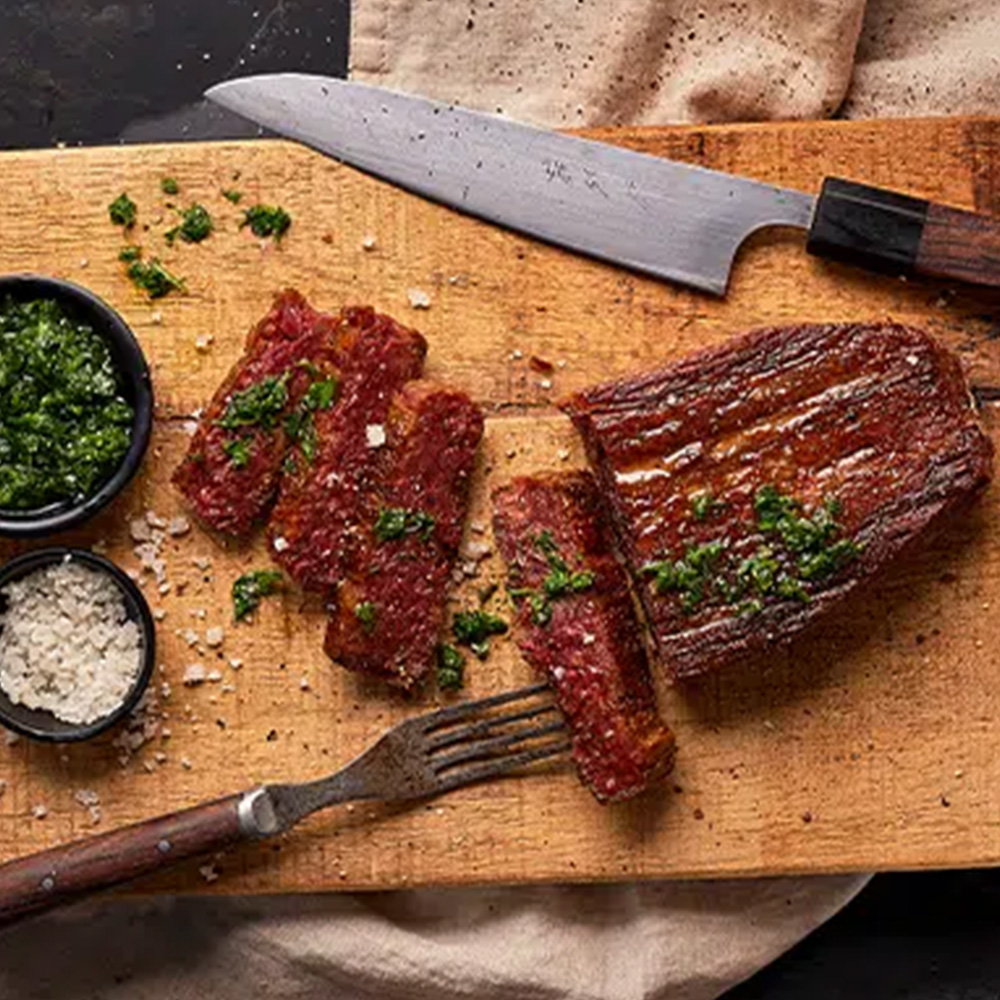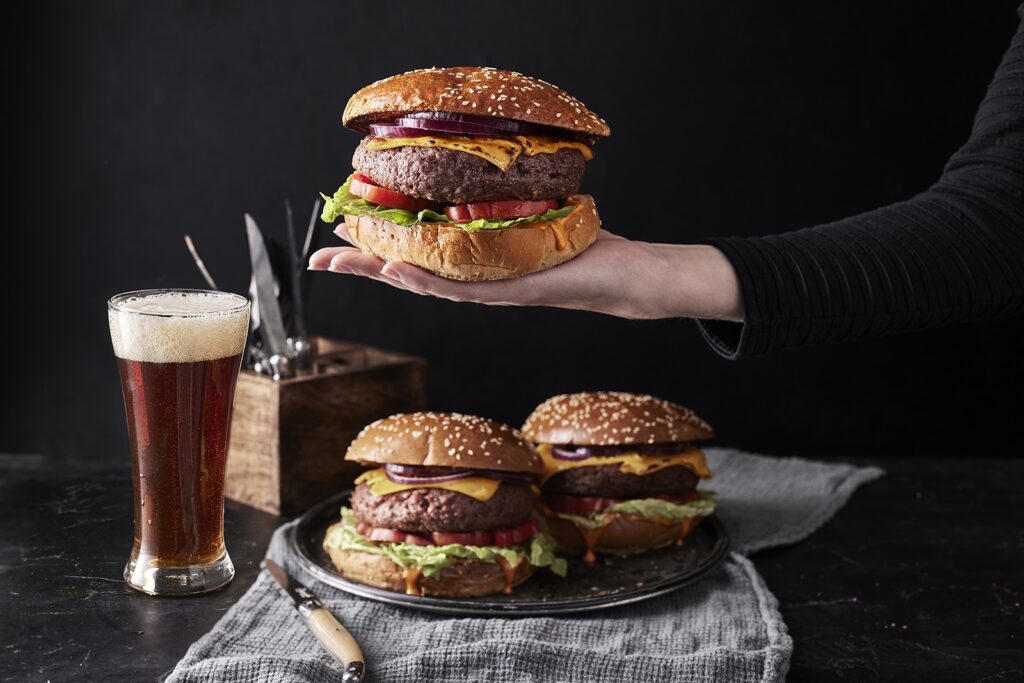
With slogans like ‘A whole different animal,’ and ‘Precisely the same, entirely different,’ startup unveils its high-end, plant-based 3-D printed products at Tel Aviv tasting

In recent years, Israeli tech has been carving a name for itself in the alternative protein field, coming up with varied ways to replace real meat, the production of which is a key contributor to global warming.
In the main, meat substitutes are being made either from plant-based materials or from the multiplication of real cells taken from animals without causing them harm.
As a vegetarian since 2012 and a 95% vegan for four or five years (sorry, but almond milk doesn’t cut it for me in a real British cup of tea), I have followed developments closely.
I gave up meat for moral and environmental reasons, but still secretly salivate over the gorgeous smells that emanate from the kitchen when my most carnivorous son grills a steak.
This is why I accepted an invitation to a glitzy event held by Redefine Meat in Tel Aviv earlier this week to launch the company’s first series of plant-based alternative meat products.
The atmosphere was high-end, the message was that this was a quality product. The designer flower arrangements were real (these days you never know), the bar was large and sumptuously stocked, there were free tattoos (the carnivore son will never forgive me for not having taken him) and several stylish pop-up ‘restaurants’ presented taster dishes with oodles of style.

The company combines soy and pea proteins, coconut fat, sunflower oil and natural flavorings and colorings into food formulations that it prints out with the aim of achieving the same appearance, texture and flavor as animal meat. It is the most advanced Israeli firm in the field using 3D printing, which helps it to meet one of the hardest challenges — produce alternative meat in the form of a single chunk with volume, such as a steak, that fully replicates the texture of the real thing, complete with the muscle, fat, blood and juices.
Seated at an elegant bar, and served an excellent red wine, we were treated to tiny chunks of “meat” that had been slow-cooked and then finished off on a grill whose adjacent amplifier round-sounded the realistic sizzling sound.
To me and the non-tattooed son I had taken, who still eats meat and was there to give me the carnivore’s view, it was excellent. Tasty, juicy, and very like the real deal, we agreed.
Also superb was the “lamb” kebab, served at the representative of Middle Eastern food, the ‘Jaffa Restaurant.’

Over the course of an hour, we stuffed ourselves with alternative chili con carne (our family hates coriander, so no judgment on that), Asian food (ditto the coriander), Italian meatballs and Texan beef burgers — all variations on the theme of minced meat.
The diners’ verdicts
The burgers were great — truer to the real thing, I thought than those of US company Beyond Meat, which is sold in Israel.

We wandered around trying to gauge the mood among the many foodies and tech people who were crowding in.
Two tech investors and committed vegetarians, Jason Chapnik and James Merkur, had flown in from Canada to taste the product with a view to adding Redefine Meat to their “mainly tech” portfolio.
A pair of heavily made-up middle aged-sisters sitting by the Italian restaurant said they were well impressed and hoped the world would go vegetarian.
Yaakov Mania, whose Mania Group manages the largest pig farm in Israel and supplies some 35% of non-kosher meat sold in Israel, according to the company’s website, was less enthused, pronouncing the texture of his burger to be “reasonable,” and adding that the taste and smell “don’t take me anywhere. It doesn’t have the fat that is so dominant in a burger’s beef,” he said. “Maybe a bit of liquid smoke would help?”
Redefine Meat is already working on a pork alternative. Mania admitted that this could pose a threat to his business.

Mor Cohen, the former head chef of the Carlton Hotel in Herzliya, who will take up the same position at the David Kempinski Hotel, a branch of the super-luxury hotel chain due to open later in the year on the seafront in Tel Aviv, was more upbeat.
“The slow-cooked chunk of meat felt very close to the real thing,” he said. “It had good texture — it was nice and chewy, but the taste isn’t there yet. All the mince was very successful. The Asian dish caramelized nicely. The mince was very successful, not strong in taste, but I can see myself using it.”
“We will consider using it in the hotel, but I won’t become completely vegan,” he went on. “I think its appeal will mainly be to vegetarians and vegans. Alternative meat is at a very early stage and education is needed to move more people to veganism.”
Plans are for the new Kempinsky Hotel’s dairy lobby bar to convey a message of good health and will focus on vegan food, while the main restaurant will specialize in line-caught fish and fish from eco-farms. “Sustainability is important to us,” Cohen said.
My carnivore son concluded, “If I was only given Redefine Meat, I wouldn’t know the difference, but if I was given both to compare, I would.” Although a little on the vegetarian spectrum, he’s not about to give up on meat.
The subtleties of taste
So why is it so difficult to get the taste right?

Handing us a syringe from which to taste alternative blood (it was pretty realistic….), Tal, who heads Redefine Meat’s Food Development Group, explained that while a piece of fruit has “just” 150 different tastes, a slab of roasted or grilled beef has around 2,000.
It is complex characteristics like these that company scientists have had to break down, analyze and recreate. “We do analytical and sensory comparisons,” a food technologist called Shelly explained.
Another technologist, Yael, provided us with earphones and asked us to say which barbeque sizzling sound was from a Redefine product and which was from the real thing. We both got it wrong.
We also failed to pick which of two amplified images of raw bovine meat was real.

Established in 2018, Redefine meat, now nearly 100-employees strong, works with scientists from Israel and overseas and uses a variety of tech that includes Artificial Intelligence.
Evidence collected by the company so far suggests it appeals principally to vegetarians and vegans as well as flexitarians worried by health and damage to the environment.
“We’re continually working on improvements,” explained Eshchar Ben-Shitrit, Redefine Meat’s CEO and co-founder, who started the Rehovot-based business with Adam Lahav, now chief business officer, in a garage in Ness Ziona, and now aims for it to become “the biggest meat company in the world.”
He sees it competing not with alternative protein giants such as Beyond Meat and Impossible Meat, but replacing any need for the cow by producing alternatives to every beef cut there is and replicating the entire “sensual experience” of eating meat.

“In ten years from now, we will look back and think it was crazy that we grew and then slaughtered animals to enjoy good food,” he said.
“We traveled the world to learn what meat is and why we love it so much,” he said. “We talked with restaurateurs and chefs and butchers to understand what works, and spent three years on technical development. We started tastings 18 months ago (for around 1,000 people) and tonight, we’re launching our first range of products.”
These include the lamb kebab, the 170-gram beef burger, sausages, cigars, and mincemeat, to be distributed via Best Meister.
They are being phased in at high-end meat restaurants, delicatessens and butcher stores before being supplied to supermarkets. Among the restaurants are Tel Aviv’s Hudson, Hatraklin Bistro, C2, Asif and Bodega American Kitchen. Elsewhere they will be on the menu at Sinta Bar in Haifa, in the north, and at Eddie’s Hideaway in Eilat in the south.